Essay: Human Development and Lifespan Transition Issues Analysis
VerifiedAdded on 2020/09/17
|7
|1368
|31
Essay
AI Summary
This essay examines human development, focusing on a case study involving a 3-year-old boy, Jack, and his mother, Vanessa, who is concerned about his development. The essay explores Piaget's stage theory of cognitive development, outlining the sensorimotor, pre-operational, concrete, and formal stages, and how they relate to Jack's age. It also touches upon Erikson's stages of social-emotional development, emphasizing the importance of trust and care in early childhood. The essay references relevant literature, including works by Beins, Demetriou, and Getzin, and provides an overview of social and cognitive development, with factors influencing cognitive development such as environmental stress, sensory development, play, and social interaction. It concludes by highlighting the importance of parental care in a child's overall growth and development, including strategies for toilet training and language development. The essay provides insights into how parents can support their child's development during the early years.
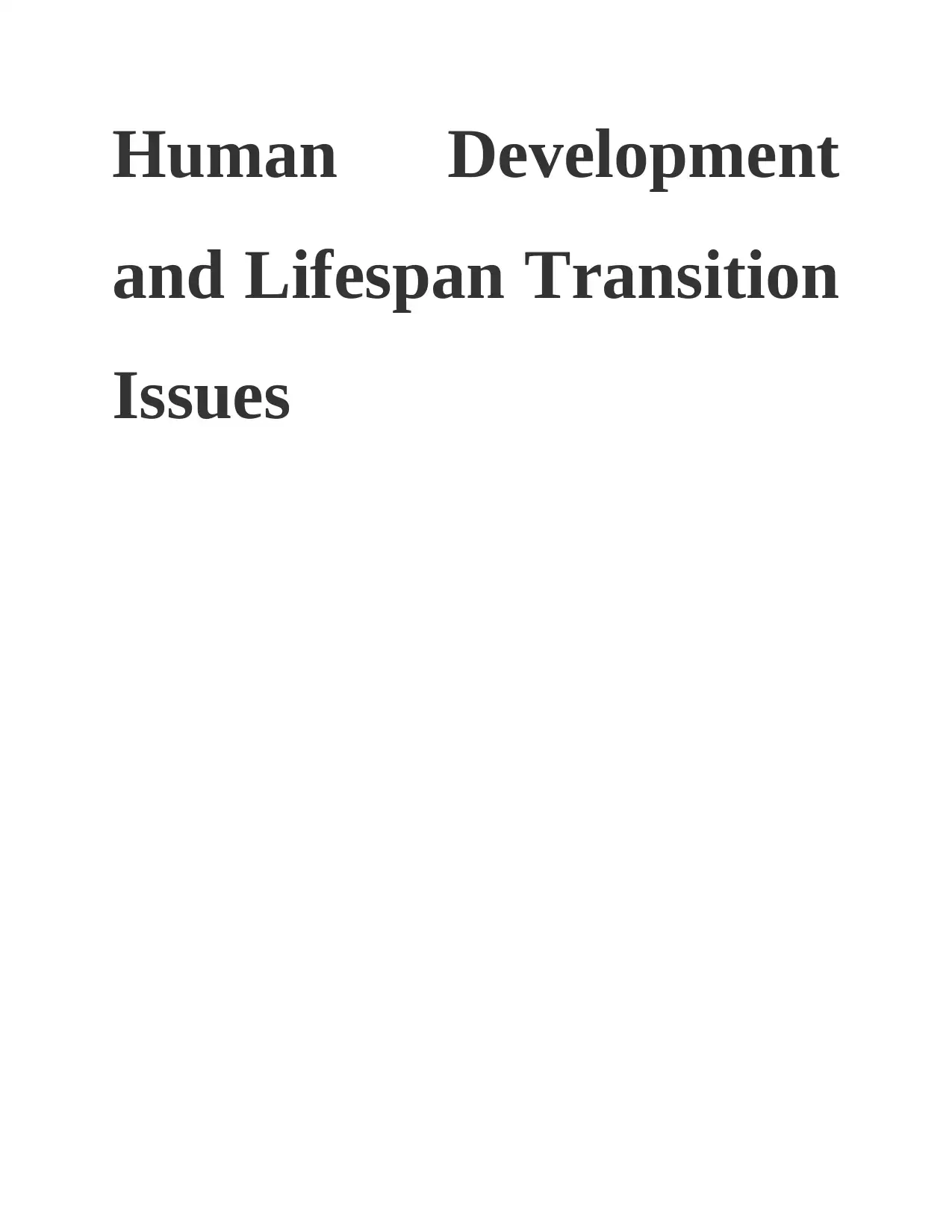
Human Development
and Lifespan Transition
Issues
and Lifespan Transition
Issues
Paraphrase This Document
Need a fresh take? Get an instant paraphrase of this document with our AI Paraphraser

TABLE OF CONTENTS
Essay................................................................................................................................................1
Stage theory of cognitive development (PIAGET).....................................................................1
References........................................................................................................................................5
Essay................................................................................................................................................1
Stage theory of cognitive development (PIAGET).....................................................................1
References........................................................................................................................................5
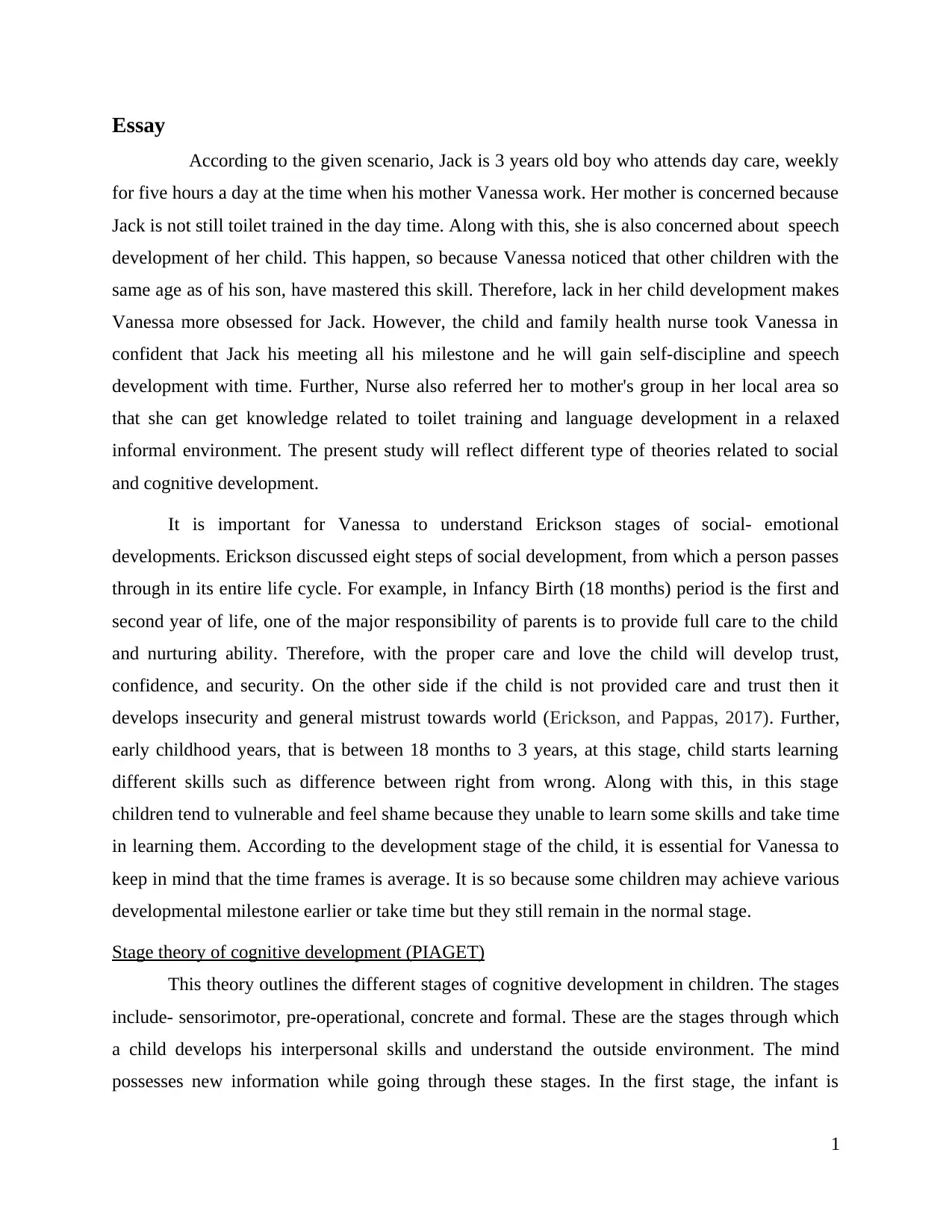
Essay
According to the given scenario, Jack is 3 years old boy who attends day care, weekly
for five hours a day at the time when his mother Vanessa work. Her mother is concerned because
Jack is not still toilet trained in the day time. Along with this, she is also concerned about speech
development of her child. This happen, so because Vanessa noticed that other children with the
same age as of his son, have mastered this skill. Therefore, lack in her child development makes
Vanessa more obsessed for Jack. However, the child and family health nurse took Vanessa in
confident that Jack his meeting all his milestone and he will gain self-discipline and speech
development with time. Further, Nurse also referred her to mother's group in her local area so
that she can get knowledge related to toilet training and language development in a relaxed
informal environment. The present study will reflect different type of theories related to social
and cognitive development.
It is important for Vanessa to understand Erickson stages of social- emotional
developments. Erickson discussed eight steps of social development, from which a person passes
through in its entire life cycle. For example, in Infancy Birth (18 months) period is the first and
second year of life, one of the major responsibility of parents is to provide full care to the child
and nurturing ability. Therefore, with the proper care and love the child will develop trust,
confidence, and security. On the other side if the child is not provided care and trust then it
develops insecurity and general mistrust towards world (Erickson, and Pappas, 2017). Further,
early childhood years, that is between 18 months to 3 years, at this stage, child starts learning
different skills such as difference between right from wrong. Along with this, in this stage
children tend to vulnerable and feel shame because they unable to learn some skills and take time
in learning them. According to the development stage of the child, it is essential for Vanessa to
keep in mind that the time frames is average. It is so because some children may achieve various
developmental milestone earlier or take time but they still remain in the normal stage.
Stage theory of cognitive development (PIAGET)
This theory outlines the different stages of cognitive development in children. The stages
include- sensorimotor, pre-operational, concrete and formal. These are the stages through which
a child develops his interpersonal skills and understand the outside environment. The mind
possesses new information while going through these stages. In the first stage, the infant is
1
According to the given scenario, Jack is 3 years old boy who attends day care, weekly
for five hours a day at the time when his mother Vanessa work. Her mother is concerned because
Jack is not still toilet trained in the day time. Along with this, she is also concerned about speech
development of her child. This happen, so because Vanessa noticed that other children with the
same age as of his son, have mastered this skill. Therefore, lack in her child development makes
Vanessa more obsessed for Jack. However, the child and family health nurse took Vanessa in
confident that Jack his meeting all his milestone and he will gain self-discipline and speech
development with time. Further, Nurse also referred her to mother's group in her local area so
that she can get knowledge related to toilet training and language development in a relaxed
informal environment. The present study will reflect different type of theories related to social
and cognitive development.
It is important for Vanessa to understand Erickson stages of social- emotional
developments. Erickson discussed eight steps of social development, from which a person passes
through in its entire life cycle. For example, in Infancy Birth (18 months) period is the first and
second year of life, one of the major responsibility of parents is to provide full care to the child
and nurturing ability. Therefore, with the proper care and love the child will develop trust,
confidence, and security. On the other side if the child is not provided care and trust then it
develops insecurity and general mistrust towards world (Erickson, and Pappas, 2017). Further,
early childhood years, that is between 18 months to 3 years, at this stage, child starts learning
different skills such as difference between right from wrong. Along with this, in this stage
children tend to vulnerable and feel shame because they unable to learn some skills and take time
in learning them. According to the development stage of the child, it is essential for Vanessa to
keep in mind that the time frames is average. It is so because some children may achieve various
developmental milestone earlier or take time but they still remain in the normal stage.
Stage theory of cognitive development (PIAGET)
This theory outlines the different stages of cognitive development in children. The stages
include- sensorimotor, pre-operational, concrete and formal. These are the stages through which
a child develops his interpersonal skills and understand the outside environment. The mind
possesses new information while going through these stages. In the first stage, the infant is
1
⊘ This is a preview!⊘
Do you want full access?
Subscribe today to unlock all pages.

Trusted by 1+ million students worldwide
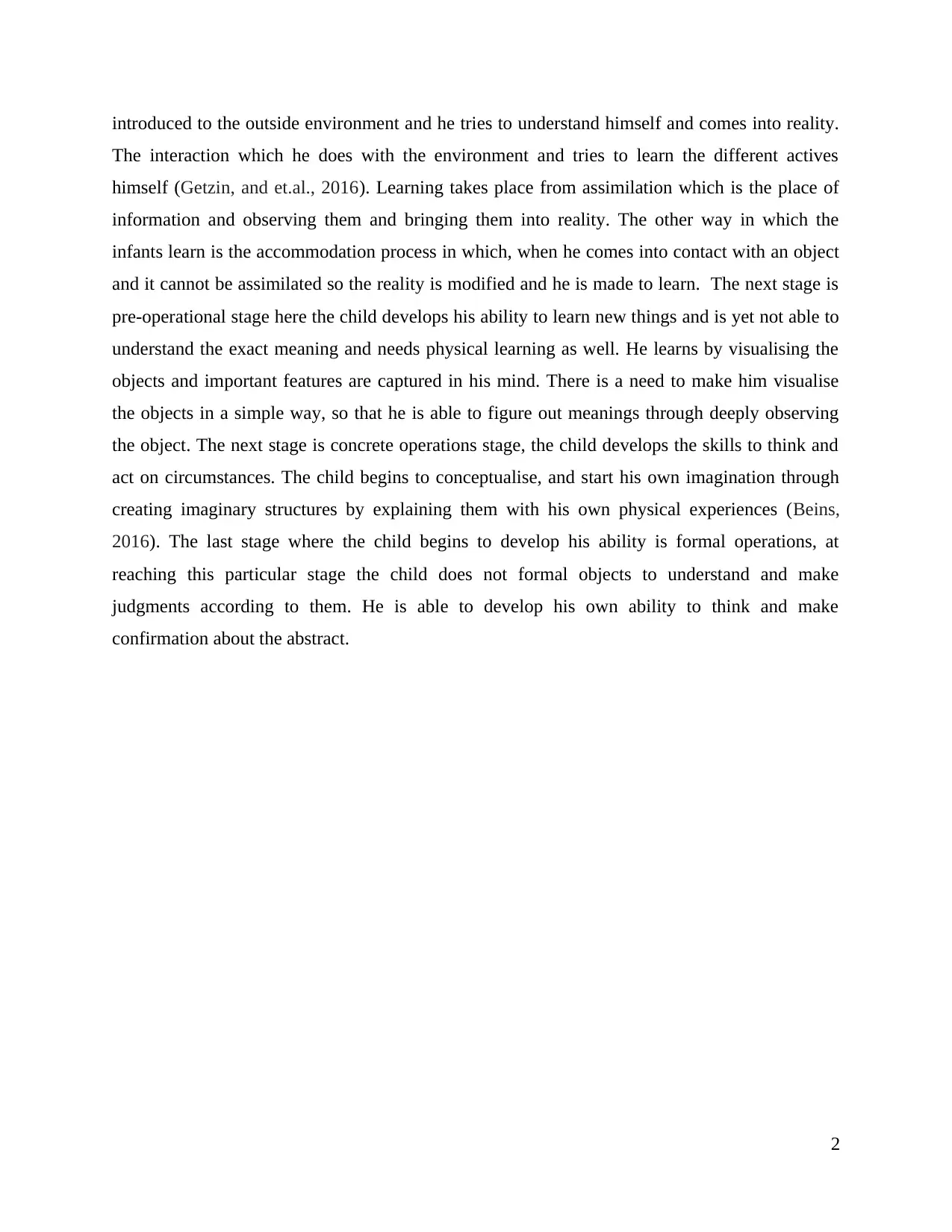
introduced to the outside environment and he tries to understand himself and comes into reality.
The interaction which he does with the environment and tries to learn the different actives
himself (Getzin, and et.al., 2016). Learning takes place from assimilation which is the place of
information and observing them and bringing them into reality. The other way in which the
infants learn is the accommodation process in which, when he comes into contact with an object
and it cannot be assimilated so the reality is modified and he is made to learn. The next stage is
pre-operational stage here the child develops his ability to learn new things and is yet not able to
understand the exact meaning and needs physical learning as well. He learns by visualising the
objects and important features are captured in his mind. There is a need to make him visualise
the objects in a simple way, so that he is able to figure out meanings through deeply observing
the object. The next stage is concrete operations stage, the child develops the skills to think and
act on circumstances. The child begins to conceptualise, and start his own imagination through
creating imaginary structures by explaining them with his own physical experiences (Beins,
2016). The last stage where the child begins to develop his ability is formal operations, at
reaching this particular stage the child does not formal objects to understand and make
judgments according to them. He is able to develop his own ability to think and make
confirmation about the abstract.
2
The interaction which he does with the environment and tries to learn the different actives
himself (Getzin, and et.al., 2016). Learning takes place from assimilation which is the place of
information and observing them and bringing them into reality. The other way in which the
infants learn is the accommodation process in which, when he comes into contact with an object
and it cannot be assimilated so the reality is modified and he is made to learn. The next stage is
pre-operational stage here the child develops his ability to learn new things and is yet not able to
understand the exact meaning and needs physical learning as well. He learns by visualising the
objects and important features are captured in his mind. There is a need to make him visualise
the objects in a simple way, so that he is able to figure out meanings through deeply observing
the object. The next stage is concrete operations stage, the child develops the skills to think and
act on circumstances. The child begins to conceptualise, and start his own imagination through
creating imaginary structures by explaining them with his own physical experiences (Beins,
2016). The last stage where the child begins to develop his ability is formal operations, at
reaching this particular stage the child does not formal objects to understand and make
judgments according to them. He is able to develop his own ability to think and make
confirmation about the abstract.
2
Paraphrase This Document
Need a fresh take? Get an instant paraphrase of this document with our AI Paraphraser
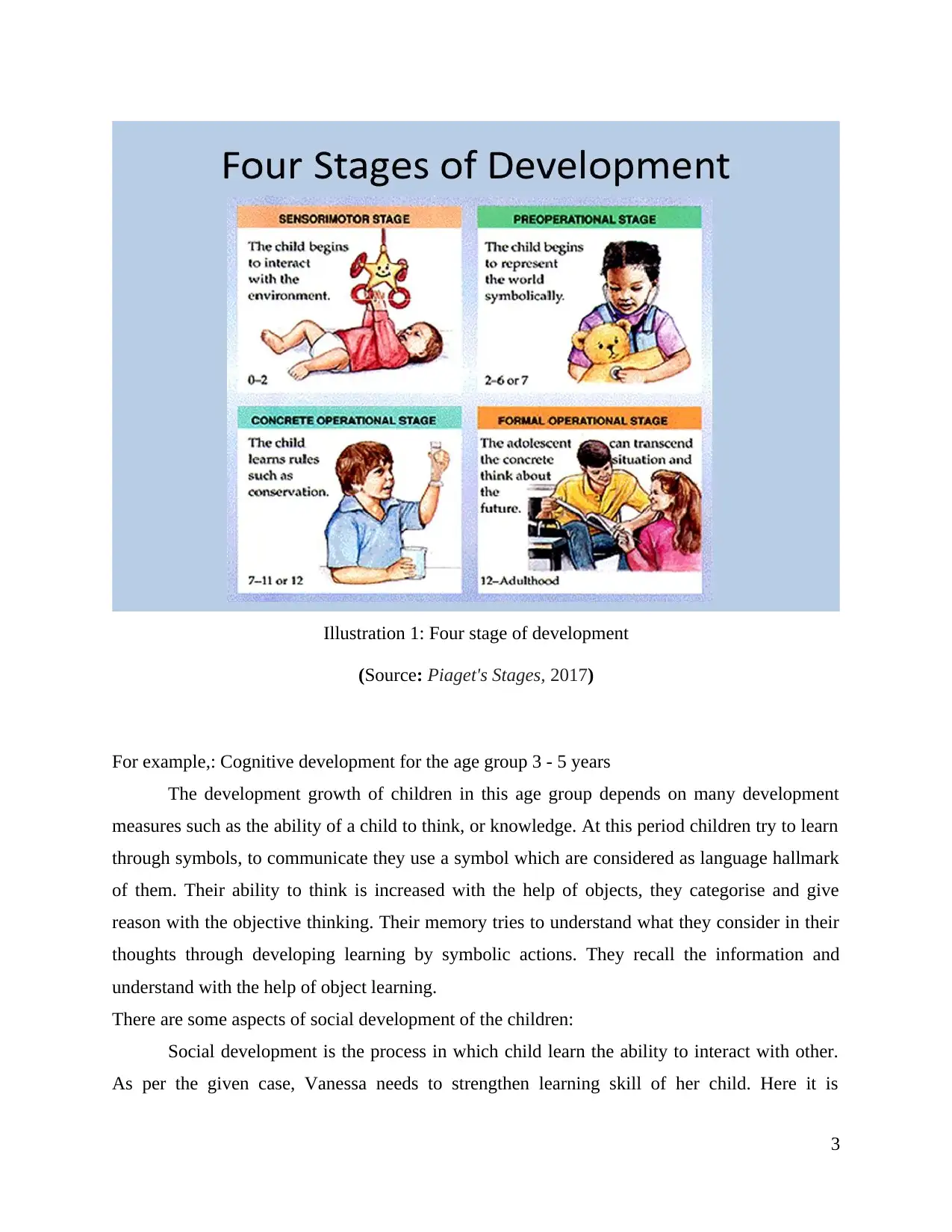
For example,: Cognitive development for the age group 3 - 5 years
The development growth of children in this age group depends on many development
measures such as the ability of a child to think, or knowledge. At this period children try to learn
through symbols, to communicate they use a symbol which are considered as language hallmark
of them. Their ability to think is increased with the help of objects, they categorise and give
reason with the objective thinking. Their memory tries to understand what they consider in their
thoughts through developing learning by symbolic actions. They recall the information and
understand with the help of object learning.
There are some aspects of social development of the children:
Social development is the process in which child learn the ability to interact with other.
As per the given case, Vanessa needs to strengthen learning skill of her child. Here it is
3
Illustration 1: Four stage of development
(Source: Piaget's Stages, 2017)
The development growth of children in this age group depends on many development
measures such as the ability of a child to think, or knowledge. At this period children try to learn
through symbols, to communicate they use a symbol which are considered as language hallmark
of them. Their ability to think is increased with the help of objects, they categorise and give
reason with the objective thinking. Their memory tries to understand what they consider in their
thoughts through developing learning by symbolic actions. They recall the information and
understand with the help of object learning.
There are some aspects of social development of the children:
Social development is the process in which child learn the ability to interact with other.
As per the given case, Vanessa needs to strengthen learning skill of her child. Here it is
3
Illustration 1: Four stage of development
(Source: Piaget's Stages, 2017)
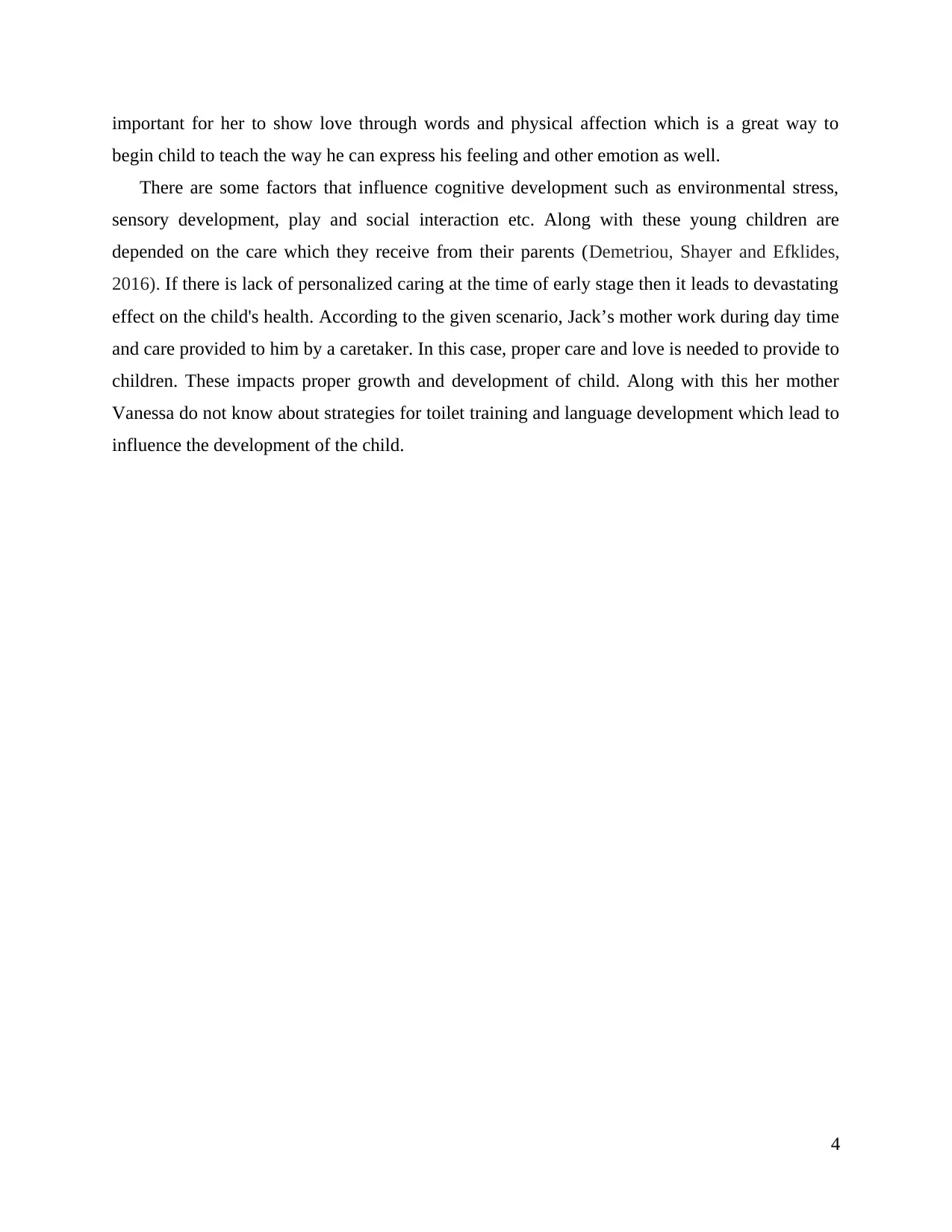
important for her to show love through words and physical affection which is a great way to
begin child to teach the way he can express his feeling and other emotion as well.
There are some factors that influence cognitive development such as environmental stress,
sensory development, play and social interaction etc. Along with these young children are
depended on the care which they receive from their parents (Demetriou, Shayer and Efklides,
2016). If there is lack of personalized caring at the time of early stage then it leads to devastating
effect on the child's health. According to the given scenario, Jack’s mother work during day time
and care provided to him by a caretaker. In this case, proper care and love is needed to provide to
children. These impacts proper growth and development of child. Along with this her mother
Vanessa do not know about strategies for toilet training and language development which lead to
influence the development of the child.
4
begin child to teach the way he can express his feeling and other emotion as well.
There are some factors that influence cognitive development such as environmental stress,
sensory development, play and social interaction etc. Along with these young children are
depended on the care which they receive from their parents (Demetriou, Shayer and Efklides,
2016). If there is lack of personalized caring at the time of early stage then it leads to devastating
effect on the child's health. According to the given scenario, Jack’s mother work during day time
and care provided to him by a caretaker. In this case, proper care and love is needed to provide to
children. These impacts proper growth and development of child. Along with this her mother
Vanessa do not know about strategies for toilet training and language development which lead to
influence the development of the child.
4
⊘ This is a preview!⊘
Do you want full access?
Subscribe today to unlock all pages.

Trusted by 1+ million students worldwide
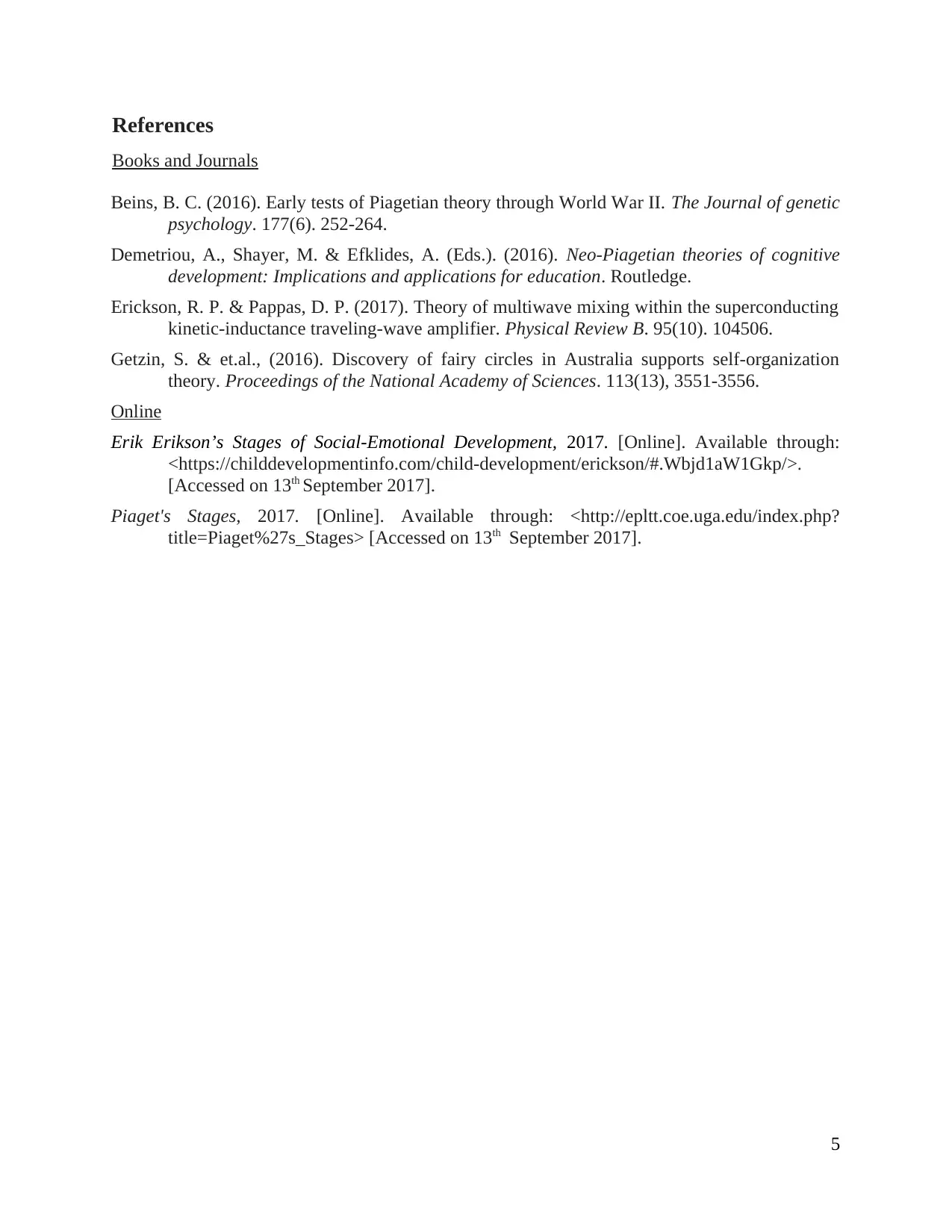
References
Books and Journals
Beins, B. C. (2016). Early tests of Piagetian theory through World War II. The Journal of genetic
psychology. 177(6). 252-264.
Demetriou, A., Shayer, M. & Efklides, A. (Eds.). (2016). Neo-Piagetian theories of cognitive
development: Implications and applications for education. Routledge.
Erickson, R. P. & Pappas, D. P. (2017). Theory of multiwave mixing within the superconducting
kinetic-inductance traveling-wave amplifier. Physical Review B. 95(10). 104506.
Getzin, S. & et.al., (2016). Discovery of fairy circles in Australia supports self-organization
theory. Proceedings of the National Academy of Sciences. 113(13), 3551-3556.
Online
Erik Erikson’s Stages of Social-Emotional Development, 2017. [Online]. Available through:
<https://childdevelopmentinfo.com/child-development/erickson/#.Wbjd1aW1Gkp/>.
[Accessed on 13th September 2017].
Piaget's Stages, 2017. [Online]. Available through: <http://epltt.coe.uga.edu/index.php?
title=Piaget%27s_Stages> [Accessed on 13th September 2017].
5
Books and Journals
Beins, B. C. (2016). Early tests of Piagetian theory through World War II. The Journal of genetic
psychology. 177(6). 252-264.
Demetriou, A., Shayer, M. & Efklides, A. (Eds.). (2016). Neo-Piagetian theories of cognitive
development: Implications and applications for education. Routledge.
Erickson, R. P. & Pappas, D. P. (2017). Theory of multiwave mixing within the superconducting
kinetic-inductance traveling-wave amplifier. Physical Review B. 95(10). 104506.
Getzin, S. & et.al., (2016). Discovery of fairy circles in Australia supports self-organization
theory. Proceedings of the National Academy of Sciences. 113(13), 3551-3556.
Online
Erik Erikson’s Stages of Social-Emotional Development, 2017. [Online]. Available through:
<https://childdevelopmentinfo.com/child-development/erickson/#.Wbjd1aW1Gkp/>.
[Accessed on 13th September 2017].
Piaget's Stages, 2017. [Online]. Available through: <http://epltt.coe.uga.edu/index.php?
title=Piaget%27s_Stages> [Accessed on 13th September 2017].
5
1 out of 7
Related Documents
Your All-in-One AI-Powered Toolkit for Academic Success.
+13062052269
info@desklib.com
Available 24*7 on WhatsApp / Email
![[object Object]](/_next/static/media/star-bottom.7253800d.svg)
Unlock your academic potential
Copyright © 2020–2026 A2Z Services. All Rights Reserved. Developed and managed by ZUCOL.





